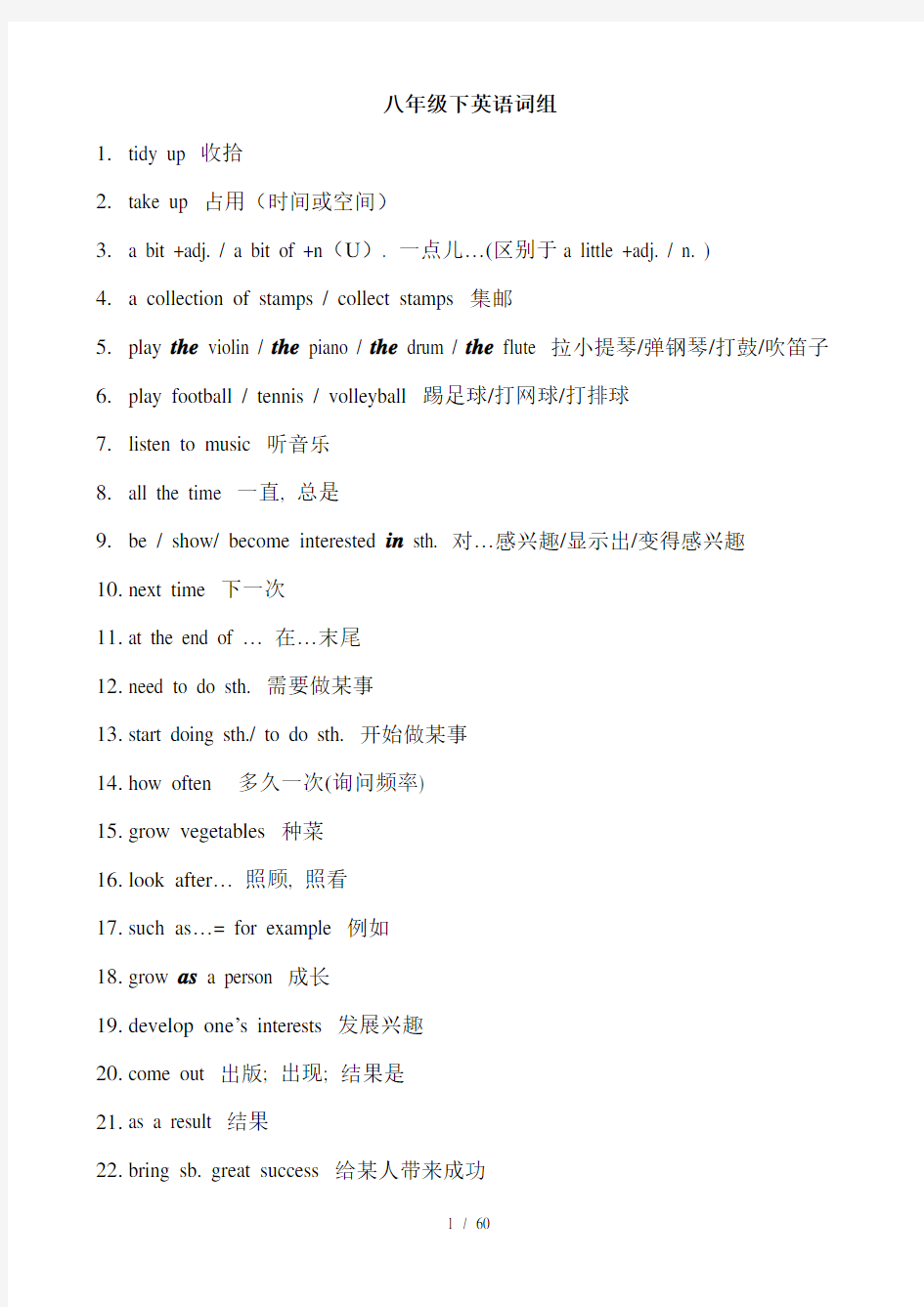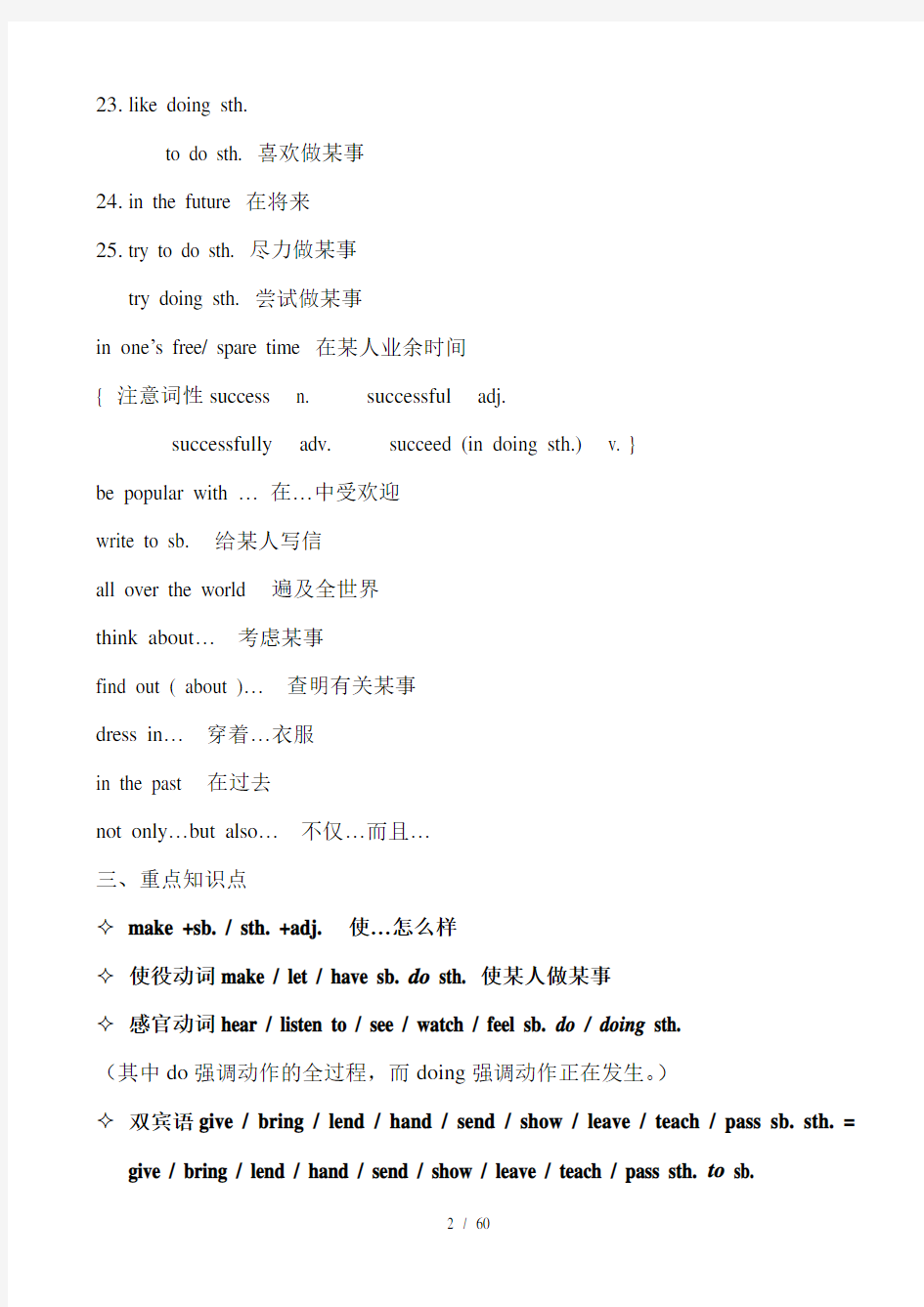八年级下英语词组


八年级下英语词组
1.tidy up 收拾
2.take up 占用(时间或空间)
3. a bit +adj. / a bit of +n(U). 一点儿…(区别于a little +adj. / n. )
4. a collection of stamps / collect stamps 集邮
5.play the violin / the piano / the drum / the flute 拉小提琴/弹钢琴/打鼓/吹笛子
6.play football / tennis / volleyball 踢足球/打网球/打排球
7.listen to music 听音乐
8.all the time 一直, 总是
9.be / show/ become interested in sth. 对…感兴趣/显示出/变得感兴趣
10.next time 下一次
11.at the end of …在…末尾
12.need to do sth. 需要做某事
13.start doing sth./ to do sth. 开始做某事
14.how often 多久一次(询问频率)
15.grow vegetables 种菜
16.look after…照顾, 照看
17.such as…= for example 例如
18.grow as a person 成长
19.develop one’s interests 发展兴趣
https://www.360docs.net/doc/8211998049.html,e out 出版; 出现; 结果是
21.as a result 结果
22.bring sb. great success 给某人带来成功
23.like doing sth.
to do sth. 喜欢做某事
24.in the future 在将来
25.try to do sth. 尽力做某事
try doing sth. 尝试做某事
in one’s free/ spare time 在某人业余时间
{ 注意词性success n. successful adj.
successfully adv. succeed (in doing sth.) v. }
be popular with …在…中受欢迎
write to sb. 给某人写信
all over the world 遍及全世界
think about…考虑某事
find out ( about )…查明有关某事
dress in…穿着…衣服
in the past 在过去
not only…but also…不仅…而且…
三、重点知识点
?make +sb. / sth. +adj. 使…怎么样
?使役动词make / let / have sb. do sth. 使某人做某事
?感官动词hear / listen to / see / watch / feel sb. do / doing sth.
(其中do强调动作的全过程,而doing强调动作正在发生。)
?双宾语give / bring / lend / hand / send / show / leave / teach / pass sb. sth. =
give / bring / lend / hand / send / show / leave / teach / pass sth. to sb.
.
?help sb. (to) do sth. 帮助某人做某事
help sb. with sth.
?spend …(时间或钱) on + 名词
spend …. (时间或钱) (in) doing sth.
spend主语是人,花费的对象可以为时间,也可以为钱,多用于spend …(时间或钱) on + 名词/ spend …. (时间或钱) (in) doing sth. 这两个结构中。
pay 主语是人,花费的对象为钱,多用于下面的结构中:
pay (sb.) (some money) (for sth.)
?as well as…
We all want to visit Beijing as well as Shanghai.
He as well as his friends is coming to see me.
(这里注意as well as…在句中做状语,不是主语成分,所以谓语动词要看前面的主语中心词。)
?ask sb. (not) to do sth. / tell sb. (not) to do sth.
?What do you think of…? / How do you like…?
?Why not do sth? = Why don’t you do sth?
hold the line (= hold on) 稍等,别挂断。
call back 打(电话)回来
right now 现在
take a message 捎个信儿
leave a message 留个信儿
whether…or not 是否
in fact 事实上
a couple of…几个,若干
in a week 一周后(用于将来时)
miss one’s close friends 想念某人的好朋友
be different from… (反义:the same as…) 与…不同(反义:与…相同) make friends with sb. 与…交朋友
good luck with…祝…好运
bring sb. for a visit to some place 带某人来某地参观
wait for sb. (to do sth.) 等待某人做某事
invite sb. to do sth. / invite sb. to some place 邀请某人去做某事/去某地talk with/to sb about sth. 和某人谈论某事
by the way 顺便说一下
feel happy / unhappy / better 感觉快乐/不快乐/更好
take place 发生
far (away) from some place 离某地远
be afraid to do sth. / be afraid of sth./doing sth. 害怕做某事
every time + 时间状语从句每次
want (sb.) to do sth. 想让某人做某事
worry about…担心…
sit at the desk / work at the computer 坐在桌旁/在电脑前工作
as usual 像往常一样
at that moment 在那时
enter the room (注意enter是及物动词,后不加介词。) 进入房间
turn back 转过身
day by day 一天天地
be close to…离…近
smile at sb. 对…微笑
laugh at sb. 嘲笑某人
It doesn’t matter (that….). …….没关系
not …any more / not…any longer 不再
give advice / take advice 提出建议/接受建议
look for…寻找…
in town / in the country 在城镇/在乡村
一、重要知识点
?What does it feel like? 用来询问对方对某件事的看法。类似的表达还有What do you think of…? / How do you like…?
?辨析sometime, some time, sometimes, some times sometime某个时候,表示时间点,多用于将来。
I believe that my dream will come true sometime in the future. some time一段时间,表示时间段,多用于现在完成时。
He has been here for some time.
sometimes有时,表频率,多用于一般现在时。
It’s sometimes hot and sometimes cold.
some times若干次/若干倍
I have been to Sydney some times.
?辨析lonely 与alone
lonely是adj. 表示“孤独的”,是内心的感受,而alone可做adj.或adv.,表示“独自一人地”,是现实的状况。
e.g. She felt lonely because she had no friends here. 她因为在这儿没有朋友而感到很孤独。
The old woman lives alone because her daughter is abroad. But she is not lonely because we often go to see her. 这位老奶奶一个人独自居住,因为她的女儿在国外,但她并不孤独,因为我们经常去看望她。
?辨析other, the other, others, the others
区分这四个词,只需注意以下两点:
1.没有the表示“别的,其余的”;有the强调“其余所有的”
2.若other后没有s则后面往往还有名词(单数情况除外),若other后有s 则后面不加名词。
另外,another与这四组词都不相同,它表示“又一个,再一个”,所指事物没有范围,而上面那四组词则都是将事物分成了两大部分。
e.g. English is spoken not only in the UK and the USA, but also in many other countries. (这里不强调除英美外,其余所有的国家都说英语,所以不加the,另外,后面有countries,所以other不加s。)
The old lady has four sons. One is in Canada, the others are in America.
(这里强调除一个在加拿大外,其余所有的都在美国,所以加the,另外,other 后面没有名词,所以加s。)
Would you like another cup of tea? (这里指再来一杯,没有范围。)
?当adj.修饰不定代词(something, anything, nothing, everything)时,adj.要后
置。
?辨析surprising与surprised
surprising 意为“令人惊讶的”,修饰物或事;而surprised意为“吃惊的”,修饰人。
e.g. The news is surprising.
I’m surprised at the news.
类似的单词还有exciting (excited), tiring (tired), pleasing (pleased), amazing (amazed)等。
?掌握一些固定电话用语:
Is Chen Huan there? 请问陈欢在吗?
Is that Chen Huan (speaking)? 您是陈欢吗?
May I speak to Jack, please? 杰克在吗?
I’ll call back later. 我一会儿再打。
This is Sally (speaking). 我是Sally。
Who’s calling, please? 请问您是那位?
Hold the line, please. 稍等,别挂断。
Sorry. He isn’t here right now. 对不起,他现在不在。
Can I take a message? / Can you leave a message? 我能捎个信儿吗?/ 您能留个信儿吗?
I’m afraid you have the wrong number. 恐怕您打错了。
二、语法
Objective Clause宾语从句
宾语从句可根据引导词分为三大类:
1.当从句是陈述句时,用that引导,that可省略,语序不变。
◆Trees improve the air.
Betty thinks (that) trees improve the air.
◆It will snow this winter.
I hope (that) it will snow this winter.
◆There is a good film tonight.
Jack said (that) there was a good film on that night
2.当从句是一般疑问句时,用if 或whether引导(若句尾有or not,则用whether,语序由原来的疑问句语序变为陈述句语序。
◆Will they plant trees on Sunday?
He doesn’t know whether they will plant trees on Sunday or not.
◆Have you seen him before?
I can’t remember if I have seen him before.
◆Was she late for class this morning?
He asks if she was late for class this morning.
◆Did she study hard?
I didn’t know whether she studied hard or not.
3.当从句是特殊疑问句时,用原来的特殊疑问词引导,语序由原来的疑问句语序变为陈述句语序。
◆How can we help protect the environment?
He asks how we can help protect the environment.
◆Why do they like computer games so much?
I can’t understand why they like computer games so much.
◆When will we hold the sports meeting?
Do you know when we will hold the sports meeting?
Where did the accident happen?
Tom asked me where the accident happened.
掌握宾语从句,尤其要注意以下三个方面:
1.引导词
2.语序
3.时态:若主句是现在范畴的时态,从句用任何时态均可。
若主句是一般过去时,从句必须用过去范畴的时态。
1.look out ( for… ) 小心…
同义: watch out ( for… ) / be careful ( with… )
2.thank you / thanks for ( doing ) sth. 因某事谢谢你
e.g. Thanks for your help. / Thank you for coming to see me.
3. take / show sb. around ( some place ) 带某人参观某处
4. Don’t mention it. 不客气
5. enjoy doing sth. 喜欢做某事
6. want (sb.) to do sth. 想(让某人)做某事
7. remember to do sth. 记着去做某事( 此事还没做)
remember doing sth. 记着做过某事( 此事已经做过)
8. stop to do sth. 停下来去做某事( 此事还没做)
stop doing sth. 停止做某事( 此事不做了)
9. come this way 走这边
10. need to do sth. 需要做某事(主动)
need doing sth. 某事需要被做(被动)
11. speak English / French / Chinese 说英语/法语/汉语
12. keep (sb.) doing sth. 一直(让某人)做某事
e.g. He kept me waiting for an hour yesterday. 他昨天让我等了一个小时。
13. What about sth / doing sth…= How about sth / doing sth…怎么样
14. like doing / to do 喜欢做某事(反义: hate doing / to do憎恶做某事)
15. over there 在那边
16. Me, too! 我也是
17. prepare …( for…) 为…准备…
18. score two goals 进了两个球
19. win / lose the match 赢了/输了比赛
20. start doing / to do 开始做某事( 同义: begin doing / to do )
21. agree with sb. 同意某人/ agree on sth. 在某件事上达成一致/ agree to do sth. 同意做某事
22. turn on / off…打开../ 关闭.. turn up / down 把声音开大/开小
23. work on sth. 从事于..
e.g. He has been working on this project for years. 他从事这项工程很多年了.
work out sth. 制作出, 算出
e.g. Have you worked out this maths problem? 你做出这道数学题了吗?
24. decide to do sth. 决定做某事
25. listen (to…) 听…look (at…) 看…. (均表动作本身,不表结果)
26. look up (at sb/.) 向上看…look down (at sb.) 向下看…
look up to sb. 尊敬某人,看得起某人look down upon / on sb.看不起,鄙视某人27. be close to…离…近be far (away) from…离…远
